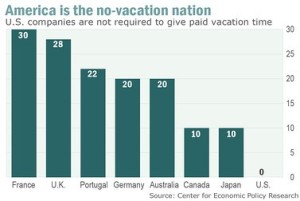Americans are so busy looking over their shoulders at work, they only take half of their paid time off.
We’re so busy looking over our shoulders at work and anxious about our jobs, we only take half of our paid time off.
Employees only use 51% of their eligible paid vacation time and paid time off, according to a recent survey of 2,300 workers who receive paid vacation. The survey was carried out by research firm Harris Interactive for the careers website Glassdoor. What’s more, 61% of Americans work while they’re on vacation, despite complaints from family members; one-in-four report being contacted by a colleague about a work-related matter while taking time off, while one-in-five have been contacted by their boss.
Workers appear to be getting more skittish when it comes to asking for time off. Although this is the first time Glassdoor asked questions about paid vacation and time off, a separate survey, “Vacation Deprivation,” carried out by Harris Interactive for travel site Expedia, shows that Americans left four days on the table within the past year, twice as many as in the previous year. That’s the equivalent of over 500 million lost vacation days a year.
Some 40% of Americans will not use their full vacation time, a separate study found, citing a post-recession “work martyr complex” among worker who feel tied to their desk. The study by GfK Public Affairs and Corporate Communications and the U.S. Travel Association – which obviously has a vested interest in workers using up all their paid vacation time – found that one-third of the 1,000-plus respondents say they cannot afford to take their time, 40% fear returning to a mountain of work and 35% believe no one else can do their work.
This complex is reinforced by company culture and lack of encouragement from management to take time off, the GfK survey found. Even though senior business leaders overwhelmingly recognize the importance of using time off, two-thirds of American employees said their company says nothing about the need to take vacation days or discourages using them. In fact, one-third of senior business leaders state they never or rarely talk with employees about the benefits of taking time off.
Most American workers receive around 10 paid work days a year and six federal holidays, according to the Center for Economic and Policy Research, a nonprofit left-of-center think tank in Washington, D.C. So based on Bureau of Labor Statistics’ current average weekly earnings, they’re leaving more than $1,300 on the table by only taking half their paid time off. Workers in the European Union are legally guaranteed at least 20 paid vacation days a year – and 25 or even 30 days a year in some European countries.
People not used to taking time off may not understand that paid vacation is actually built into their compensation package. Under theThe Fair Labor Standards Act, the U.S. is also one of the few developed countries that doesn’t require employers to provide paid time off (see chart). Still, 91% of full-time U.S. workers receive paid vacation, according to the Center for Economic and Policy Research, but only 49% of low-wage workers – those in the bottom fourth of earners – get paid vacation.
Why don’t they take what’s due? “Fear,” says Scott Dobroski, career trends analyst at Glassdoor. “That’s the underscoring theme.” Some 28% of workers told Glassdoor they fear getting behind while they’re sitting on a beach, another 17% actually say they fear losing their job, 19% don’t take all of their days in the hopes that it will give them an edge for a promotion, while 13% are competitive and wanting to outperform colleagues. As workers shoulder a heavier workload post-recession, he says others are afraid of not meeting goals.
Experts say that fear may not be misplaced. Citing cultural differences between Americans and Europeans is a “significant misreading” of the issue, says John Schmitt, senior economist at CEPR. “I don’t think that Americans love their families less than German or French workers who take all their vacation time,” he says. “Americans have less job security than European workers. That’s why they eat lunch at their desk and work late. And if you’re on vacation you are likely to miss important meetings.”
What does the boss or CEO do on vacation? Work. Even during vacation, executives sneak calls in and check emails.
Most U.S. companies have an “employment-at-will” doctrine, meaning they can be fired for any reason or no reason at all, unless they have a written contract, they’re in a labor union that has other rules relating to conditions of employment or they’re fired because of some kind of discrimination. “We have almost no job security in the U.S., no legal requirement for severance pay and, with very few exceptions, can be laid off without notice,” Schmitt says. (Of course, most employees can also leave without notice, although two weeks’ notice is standard when resigning.)
“The inability to disconnect has led to a blurring of personal versus work life,” says Piera Palazzolo, senior vice president for marketing at Dale Carnegie Training. Since people take their work with them wherever they go,” she says, “they may simply decide to stay put.” “But what’s bad for the employee,” she adds, “is also bad for the employer.” “Taking vacation is important for creativity and energy levels,” Palazzolo says. “They may be going through the motions at work, but not taking time off can lead to burnout.”
OMG please go away. LOL. CU Soon.


